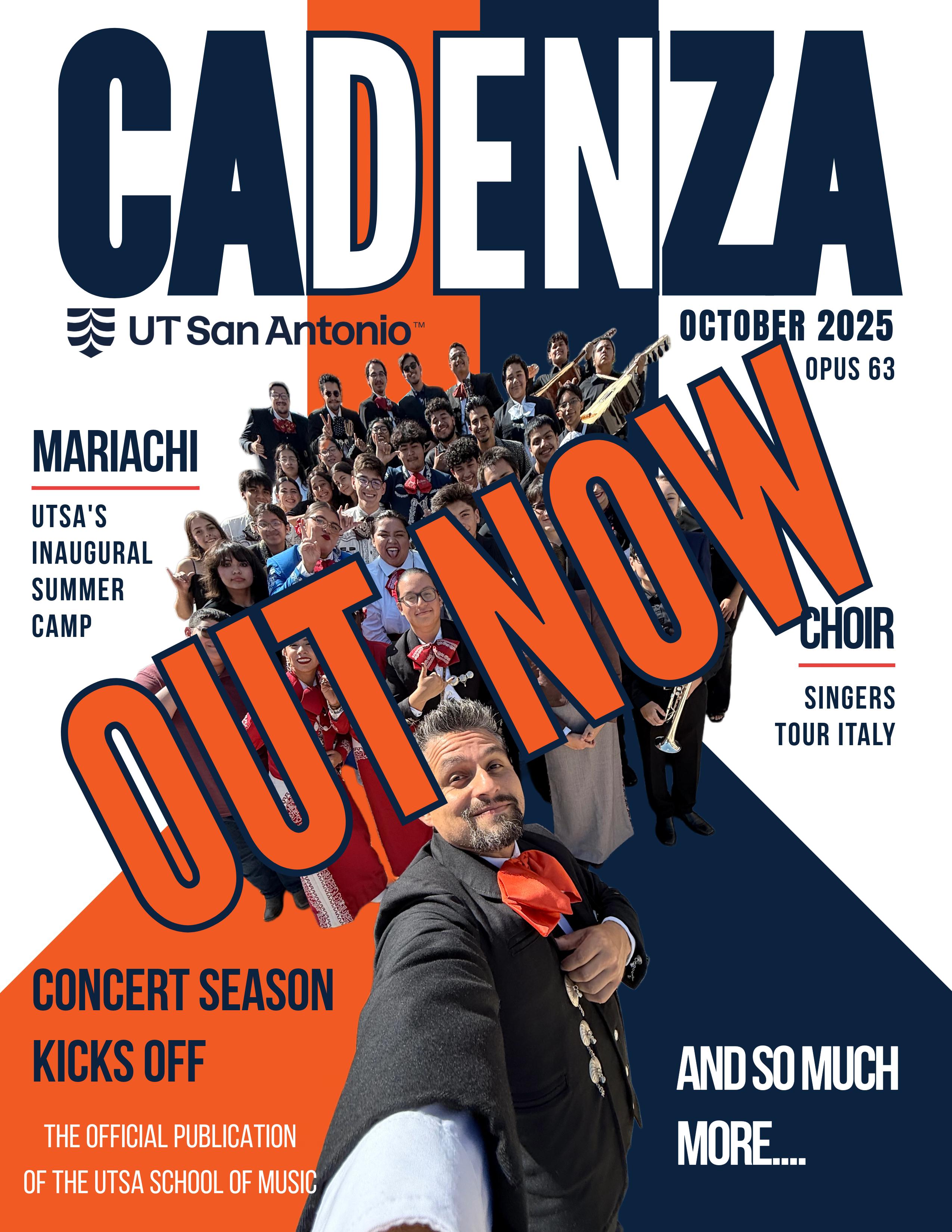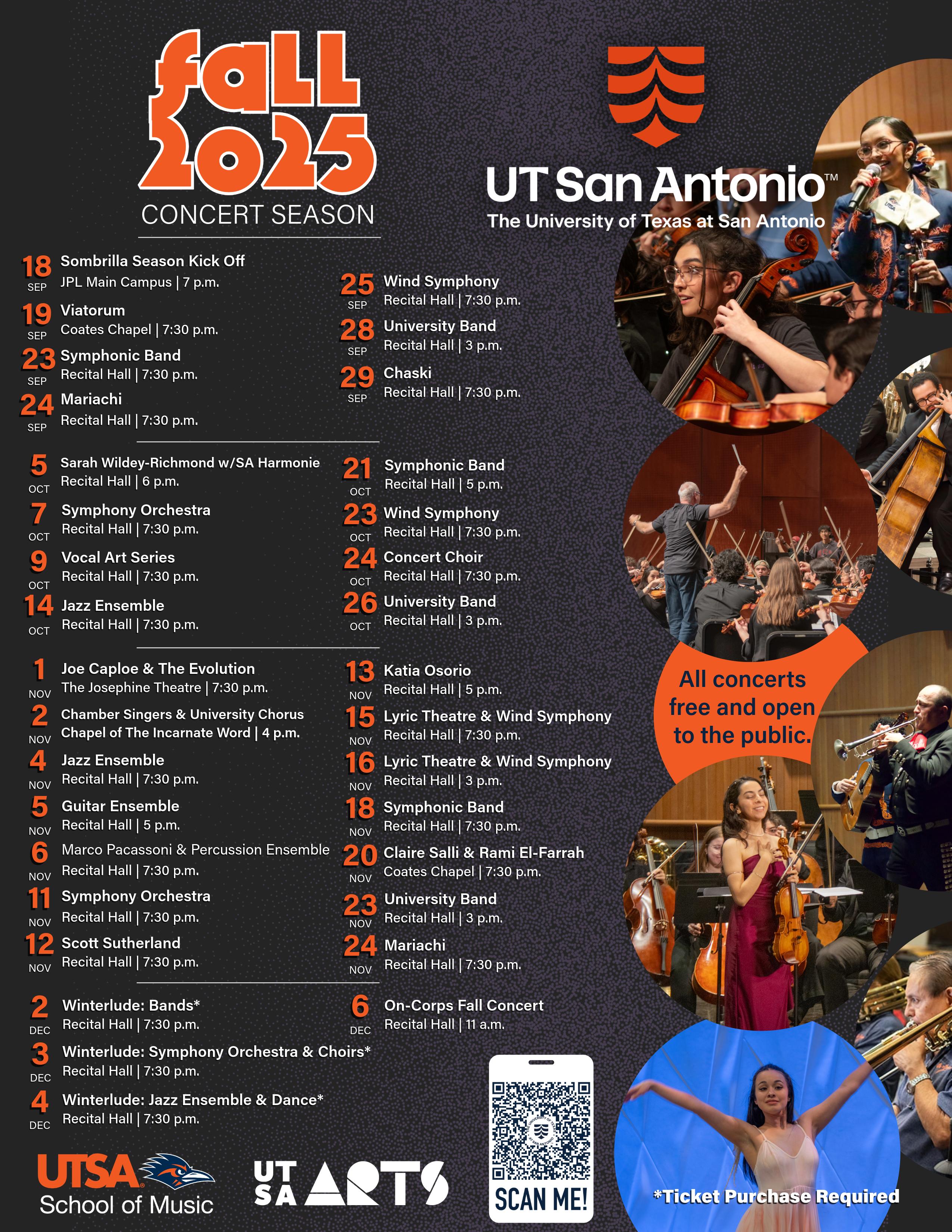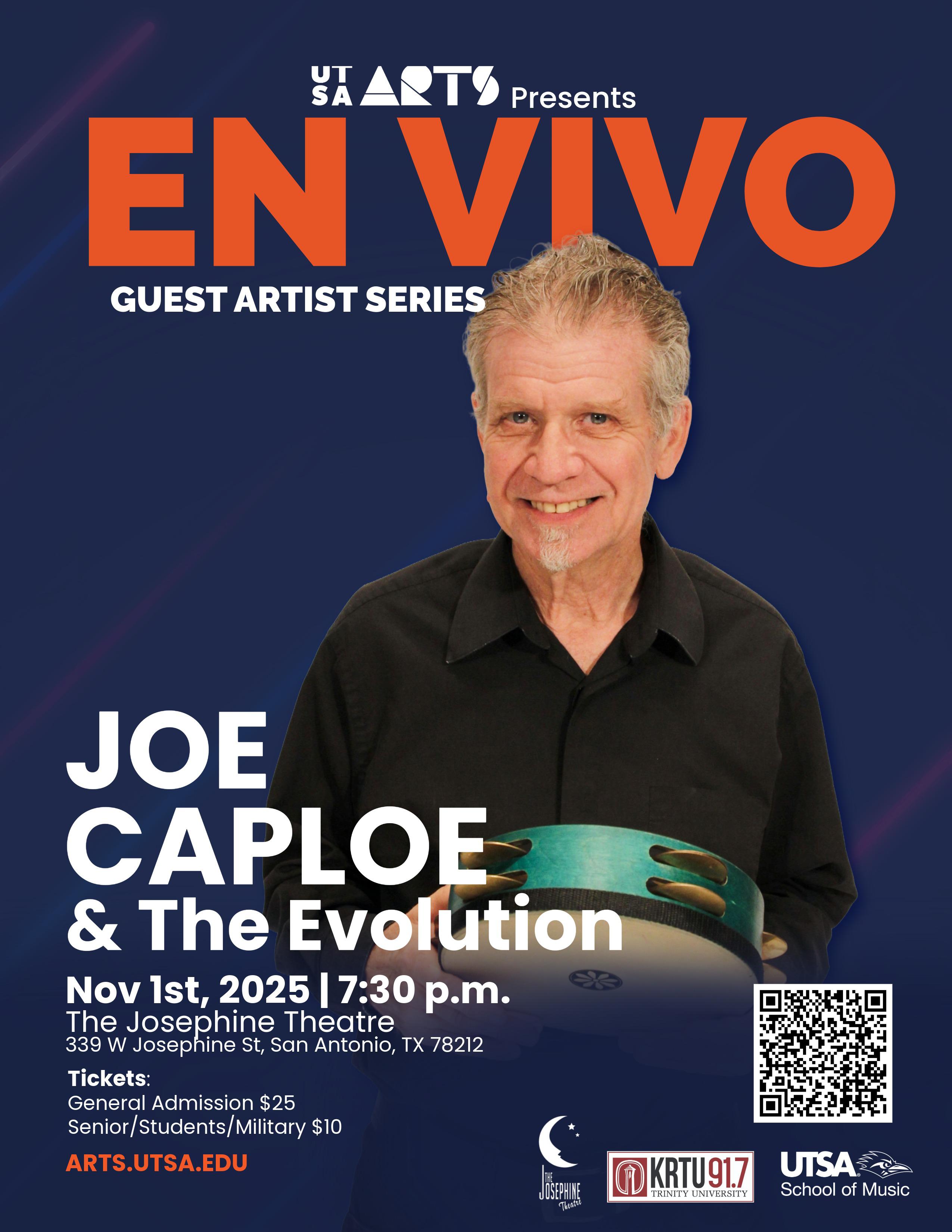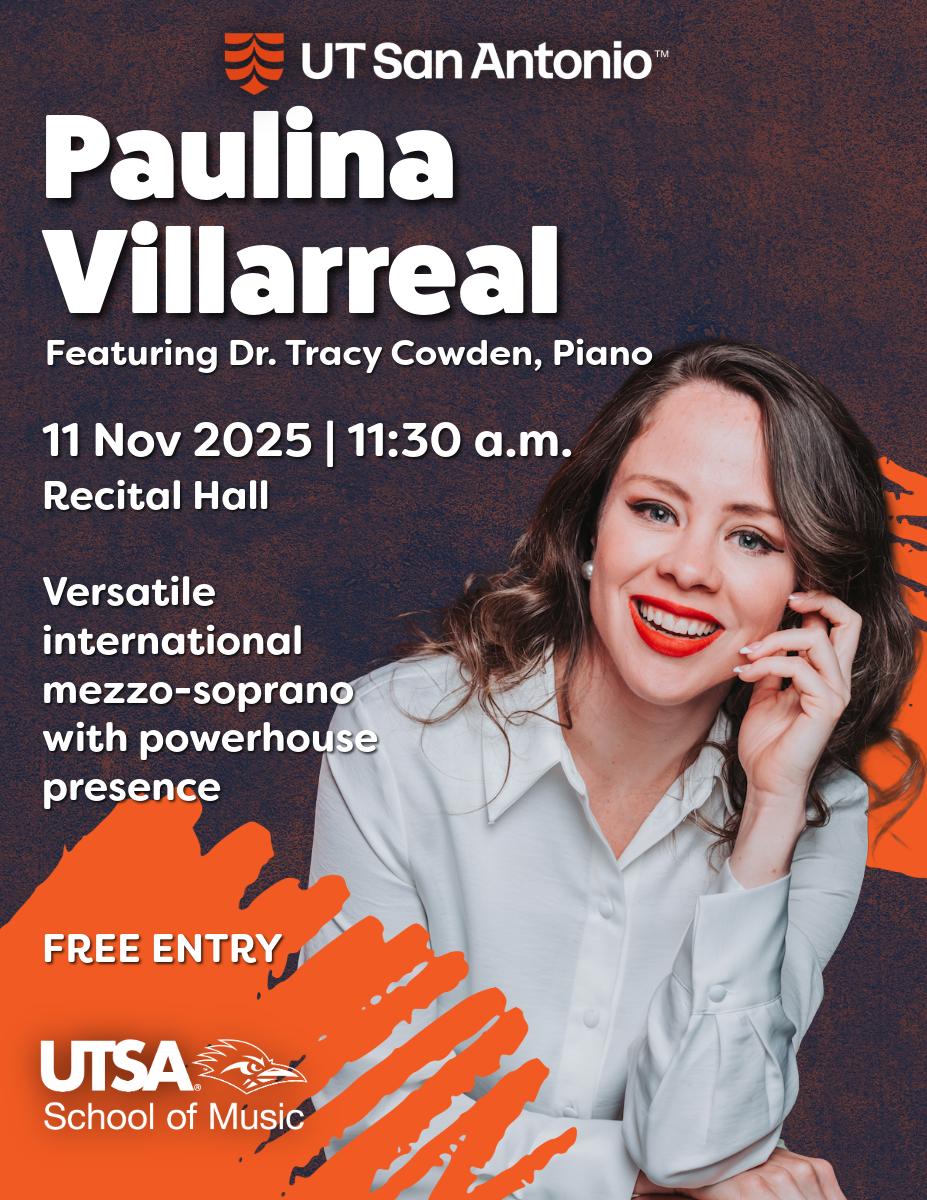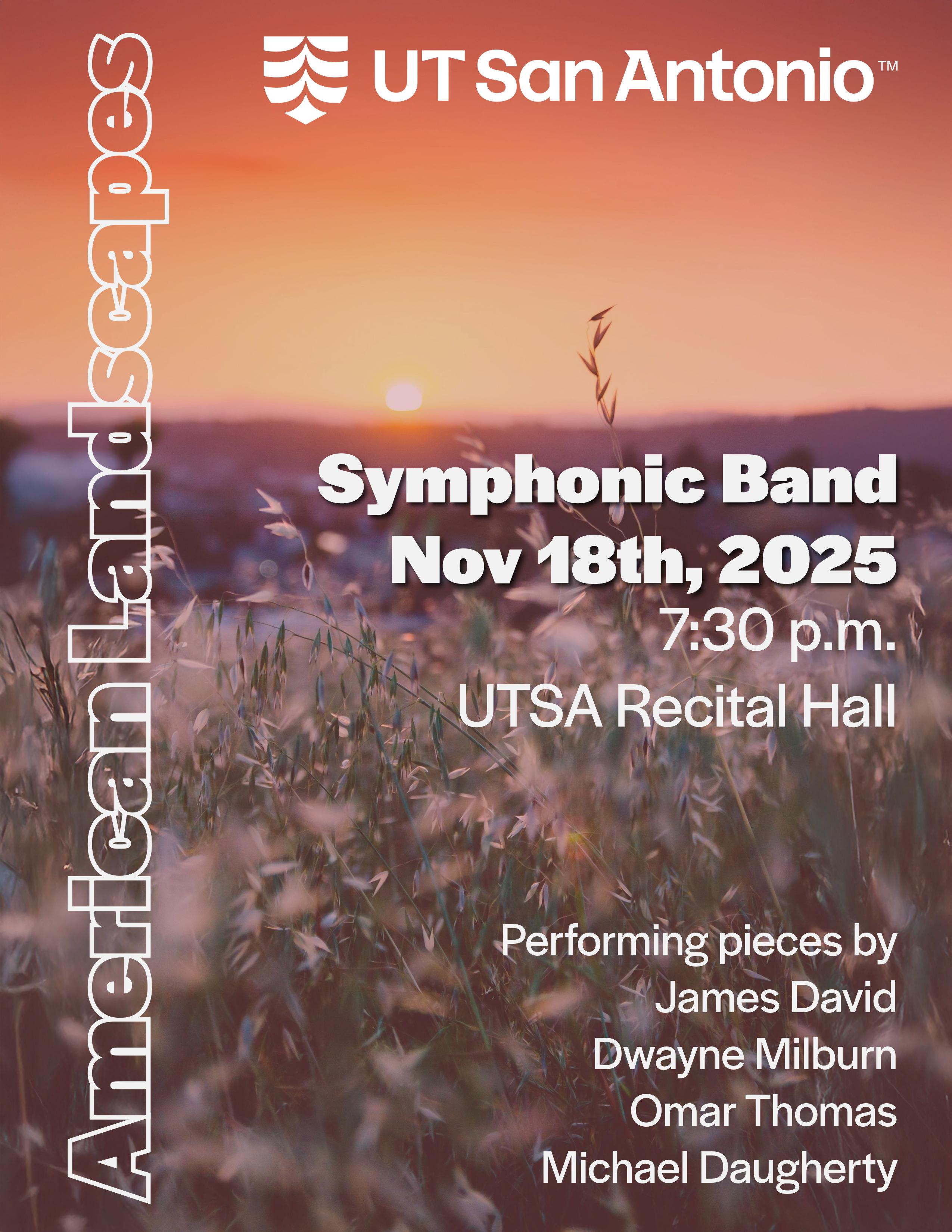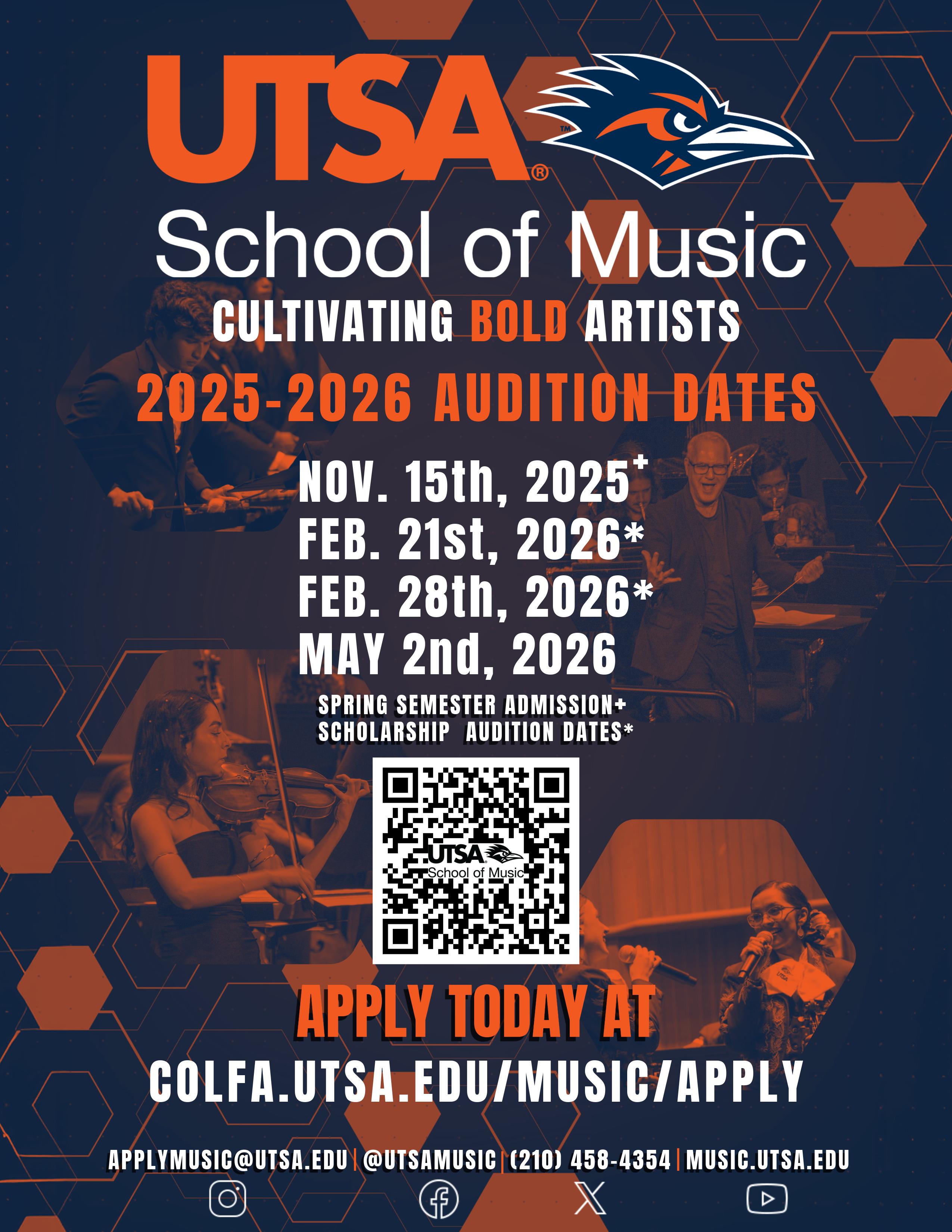
THE UNIVERSITY OF TEXAS AT SAN ANTONIO
COLLEGE OF LIBERAL AND FINE ARTS
SCHOOL OF MUSIC
PRESENTS:



THE UNIVERSITY OF TEXAS AT SAN ANTONIO
COLLEGE OF LIBERAL AND FINE ARTS
SCHOOL OF MUSIC
PRESENTS:

Hector Garcia
C O N D U C T O R
“Homage”
Homage to Perotin (1983)
Pageant (1953)
Abracadabra (2005)
Ride (2002)
Divergents (1970)
Sunday, October 26, 2025 3:00 pm
UTSA Music Recital Hall
Ron Nelson (1929 - 2023)
Vincent Persichetti (1915 - 1987)
Frank Ticheli (b. 1958)
Samuel Hazo (b. 1966)
W. Francis McBeth (1933 - 2012)
(Personnel roster is listed alphabetically to emphasize the important contribution made by each musician)
Flute
Lane Arguello
Aditi Bhuvanesh
Elisabeth Kubena
Elizabeth MacLean, piccolo
Jimena Meza
Eliana Molina
Allison Morin
Joshua Poirot
Ariana Thompson
Madeline Wilson
Double Reeds
Mia Gutierrez, oboe
Jodi Montes, oboe
Cristobal Rodriguez Falcón, bassoon
Clarinet
Alicia Cubillos
Natalie Hernandez
Danniel Ortiz
Jewel Perez +
April Rodriguez
Jacob Wall
Tarynn Williams
Ray Stevens, bass clarinet
Saxophone
Felix Castillo
Nicholas Gonzales
Jacob Granados-Hernandez
Esau Hernandez
Roberto Hernandez
Christopher Monroy
Steven Romero
Richard Ytuarte
Devin Brown, t sax
Manuel Flores, t. sax
Luis Lozano, t sax
Maile Noble, t sax
Isaac Juarez, b sax
John Ortiz, b sax
Leron Seals, b. sax
Trumpet
Kaleb Brown
Mark Cortez
Matias Garcia
Samuel Lepeska +
Joseph Middleton
Ahbab Prinon
Hameed Wilson
French Horn
Matthew Stevens + Travis Niccum
Trombone
Nicholas Arce, bass trombone
Devon Cabrera
Nicholas Gonzalez
Dylan Hernandez
William Klocke
Jasmine Lasiter
Rodrigo Mendez
Andrew Moncada
Jakarri Norsworthy
Meikhi Schwarz
Euphonium
Steven Amaro + Jayden Abney
Aiden Brickley
Roland Scherer
Tuba
Brenten Barnes
Gabriel Chavez
Christian Edens
Marc Guillen
Iliana Manzanares + Abraham Pena
Karla Perez
Frankie Rodriguez
Andrew Sandoval
Evalyn Saucedo
Sean Selvas
Mateo Trevino
Ronin Valentin
Percussion
Elias Calvillo
Erin Faehnle
Emma Fasano
Azirys Garcia - Sanchez
Gabriel Gonzales
Emmanuel Gray
Arturo Jimenez
Kathryn Kidd
Joaquin Mata
Richard Myers
+Band Managers
Hector Garcia, a native of San Antonio, Texas, is currently Assistant Director of Athletic Bands at UTSA and is the conductor of the UTSA University Band as well as the director of the UTSA Athletic Pep Band. In the fall semester, he assists directing the UTSA Spirit of San Antonio Marching Band.
Hector graduated with a master's degree in instrumental conducting from University of Texas at San Antonio in 2023 under the mentorship of Dr. John Zarco and Ron Ellis. While a graduate student at UTSA, Hector performed with the UTSA Wind Symphony and was a teaching assistant for several undergraduate courses including Conducting I & II, Marching Band Techniques, Wind Symphony, Symphonic Band, and University Band.
Prior to attending UTSA, Hector taught brass/woodwind beginning band classes, marching band, concert band, and jazz band at the high school and middle school levels for three years. He received a bachelor's degree in music studies from Texas State University in 2017. Hector’s primary instrument is trumpet and actively performs in local community bands. Hector’s professional affiliations include Texas Music Educators Association and Kappa Kappa Psi. Some of his hobbies include photography, traveling, and doing card tricks for those around him. Fun fact: his favorite food is sushi!
Compiled and Edited by Hector Garcia
Medieval Suite was written in homage to three great masters of the Middle Ages: Leonin (middle 12th century), Perotin (c. 1155-1200), and Machaut (c. 1300-1377). These are neither transcriptions of their works nor attempts at emulating their respective styles. Rather, the music served as a sort of launching pad for three pieces which draw on some of the stylistic characteristics of music from that period, e.g., repetition of rhythmic patterns or modes, modules of sound, proportions that produce octaves, fourths and fifths, use of Gregorian chant, syncopation, long pedal points where a sustained tone regulates melodic progression.
Homage to Perotin springs from his Viderunt, with its driving rhythmic intensity, repetition, and pedal points. The opening section features insistent dissonances in alternation with brass fanfarelike passages. A second theme played by unison brass is written in the Aeolian mode.
Homage to Perotin was first performed March 18, 1983, at the National Conference of the College Band Directors National Association by the Western Michigan University Symphonic Band, Richard J. Suddendorf, conductor.
[Program note by composer ]
Pageant was commissioned by the American Bandmaster's Association and was completed in January 1953. It is Persichetti's third work for band. It opens in slow tempo with a motive in the horn that is used throughout both sections of the piece. The slow chordal section is succeeded by a lively "parade" section introduced by the snare drum. In the final portion of the work the two principal subjects are developed simultaneously to a lively climax.
The first performance of this work took place on 7 March 1953, at the ABA Convention in Miami, Florida. It was performed by the University of Miami Band, with the composer conducting.
Persichetti began his musical life at a young age, first studying the piano, then the organ, double bass, tuba, theory, and composition. By the age of 11 he was paying for his own musical education and helping by performing professionally as an accompanist, radio staff pianist, church organist, and orchestra performer. At the age of 16 he was appointed choir director for the Arch Street Presbyterian Church in Philadelphia, a post he would hold for the next 20 years. During all of this, Persichetti was a student in the Philadelphia public schools and received a thorough musical education at the Combs College of Music, where he earned a degree in 1935 under Russel King Miller, his principal composition teacher.
Starting at the age of 20, he was simultaneously head of the theory and composition departments at the Combs College, a conducting major with Fritz Reiner at the Curtis Institute, and a piano major with Olga Samaroff at the Philadelphia Conservatory. He received a diploma in conducting from the Curtis Institute and graduate degrees from the Philadelphia Conservatory. In 1947 he joined the faculty of the Juilliard School of Music, and became the chairman of the Composition Department in 1963.
Persichetti composed for nearly every musical medium, with more than 120 published works. His piano music, a complete body of literature in itself, consists of six sonatinas, three volumes of poems, a concerto and a concertino for piano and orchestra, serenades, a four-hand concerto, a two-piano sonata, twelve solo piano sonatas, and various shorter works. His works for winds rank as some of the most original and well-crafted compositions in the medium, and his Symphony No. 6 is rightly considered one of the "cornerstones" of the genre.
[Program note from Wind Rep and the score)
Abracadabra was composed in the summer of 2004, and was orchestrated the following November during a residency at the MacDowell Colony. Abracadabra was commissioned by the Driscoll Middle School Band in San Antonio, Texas under the direction of Richard Gonzales.
The piece is dedicated to my son, and is at once playful and serious, innocent, and mischievous. A sense of mystery pervades as the dark key of G minor is balanced by sudden shifts to bright and sunny major keys. Throughout the composition I was thinking about magic, not in an evil or frightening sense, but as a source of fun and fantasy. My wonderfully playful, sometimes mischievous young son was always in the back of mind, as were images of Halloween with its costumes and jack-o’-lanterns. As the piece nears its conclusion, the music rushes toward what seems to be an explosive finish. But the woodwinds interrupt, fanning out to a questioning whole-tone cluster. They are answered by a puff of sound, a final disappearing act.
In strictly musical terms, the piece is as clear an example of musical economy as anything I’ve composed. Almost everything is derived from the opening bars of the main theme. Indeed, virtually every note can be traced to the main melody or its accompaniment. Because of this heightened sense of unity, I had to choose other ways to achieve musical variety. The most important solution was through the sudden and frequent shifts of mood, mode, and tonality.
[Program note by the composer )
Ride was written as a gesture of appreciation for all of the kind things Jack Stamp has done for me, ranging from his unwavering friendship to his heartfelt advice on composition and subjects beyond. During the years 2001 and 2002, some wonderful things began to happen with my compositions that were unparalleled to any professional good fortune I had previously experienced. The common thread in all of these things was Jack Stamp. I began to receive calls from all over the country, inquiring about my music, and when I traced back the steps of how someone so far away could know of my (then) unpublished works, all paths led to either reading sessions Jack had conducted, or recommendations he had made to band directors about new pieces for wind band. The noblest thing about him was that he never let me reciprocate in any way, not even allowing me to buy him dessert after a concert. All he would ever say is, "Just keep sending us the music," which I could only take as the privilege it was, as well as an opportunity to give something back that was truly unique.
In late April of 2002, Jack had invited me to take part in a composer's forum he had organized for his students at Indiana University of Pennsylvania. I was to present alongside Joseph Wilcox Jenkins, Mark Camphouse, Bruce Yurko and Aldo Forte. This forum was affectionately referred to in my house as "four famous guys and you." It was such a creatively charged event, that everyone who took part was still talking about it months after it happened. Following the first day of the forum, Jack invited all of the composers to his house, where his wife Lori had prepared an incredible gourmet dinner. Since I didn't know how to get to Jack's house (a/d/a Gavorkna House) from the university, he told me to follow him. So he and his passenger, Mark Camphous e, began the fifteen-minute drive with me behind them. The combination of such an invigorating day as well as my trying to follow Jack at the top speed a country road can be driven, is what wrote this piece in my head in the time it took to get from the IUP campus to the Stamp residence. Ride was written and titled for that exact moment in my life when Jack Stamp's generosity and lead foot were equal in their inspiration as the beautiful Indiana, Pennsylvania, countryside blurring past my car window.
[Program note by the composer.]
Divergents: A Short Symphony for Symphonic Band composed by William Francis McBeth in 1970 is a large symphonic work in four contrasting movements. The work is symphonic in nature providing the listener with a powerful musical soundscape McBeth often composed in a style accessible to younger musicians while maintaining integrity of the music by taking advantage of compositional strategies. McBeth’s well-crafted orchestration paves the way for musical ideas to develop into sustained energetic moments.
William Francis McBeth (March 9,1933 - January 6, 2012) was a prolific American composer, whose wind band works are highly respected. His primary musical influences included Clifton Williams, Bernard Rogers, and Howard Hanson. The popularity of his works in the United States during the last half of the twentieth century led to many invitations and appearances as a guest conductor, where he often conducted the premiere performances of some of his compositions, the majority of which were commissioned. His conducting activities have taken him to forty eight states, three Canadian provinces, Japan, and Australia. At one time, his Double Pyramid Balance System' was a widely used pedagogical tool in the concert band world. From 1957 until his retirement in 1996, McBeth taught at Ouachita Baptist University in Arkadelphia, Arkansas. The most outstanding of his awards have been the Presley Award at Hardin Simmons
University, the Howard Hanson Prize at the Eastman School of Music for his Third Symphony in 1963, recipient of an ASCAP Special Award each consecutive year from 1965 to present, the American School Band Directors Association's Edwin Franko Goldman Award in 1983, elected Fellow of the American Wind and Percussion Artists by the National Band Association in 1984,
National Citation from Phi Mu Alpha Sinfonia fraternity in 1985, in 1988 Phi Mu Alpha Sinfonia's Charles E. Lutton Man of Music Award for his achievement and continued contribution to American music, Kappa Kappa Psi's National Service to Music Award in 1989, Mid-West International Band and Orchestra Clinic's Medal of Honor in 1993, the John Philip Sousa Foundations Sudler Medal of Honor in 1999, and Past President of the American Bandmasters Association. In 1975 McBeth was appointed Composer Laureate of the State of Arkansas by the Governor, the first Composer Laureate named in the United States.
[Program note by the composer and conductor ]
UTSA Students, there’s a band for you!
The 350-member "Spirit of San Antonio" Marching Band is open to all UTSA students, regardless of major. Like all college bands, the group is comprised of students of various performance backgrounds. The "Spirit of San Antonio" will perform a standard pre-game show, 4-5 different halftime shows, stand tunes, and maintain UTSA traditions, while at the same time promoting a positive learning and social environment for its members. College bands strive towards being fun and spirited organizations while still achieving a quality of performance representative of the image of the university.
The UTSA Wind Ensemble is comprised of UTSA Students who have achieved an extreme high level of musicianship and who perform some of the most challenging music composed for wind band. Membership in this ensemble is open to all UTSA Students, regardless of major, who audition at the beginning of each semester. The UTSA Wind Ensemble maintains a vigorous performance schedule of three demanding concerts each semester as well as an ensemble tour when schedule and budget permits.
The UTSA Symphonic Band is made up of 45-55 outstanding wind players who perform a repertoire chosen from a variety of historical periods and for ensembles of various sizes. While the group occasionally presents pieces composed for smaller groups, much of its time is spent in the study and performance of works from the standard symphonic band repertoire. Membership is open to all students at the university who audition at the beginning of each semester.
The UTSA University Band performs a wide variety of works from different composers and arrangers, in addition to maintaining an active three-concert schedule each semester. There is no formal audition required to participate; students must be able to read music and play a concert band instrument. Membership in the ensemble includes students from almost every discipline on campus. We invite all students interested in performing in this ensemble to come out and join us at the beginning of each semester!
Dr. Tracy Cowden, Director, School of Music
Dr. Stacey Davis, Assistant Director, School of Music
Dr. Kasandra Keeling, Associate Director, School of Music
Prof. Ron Ellis, Director of Bands
Dr. John Zarco, Director of Instrumental Ensembles
Naomy Ybarra, Administrative Services Officer 1
Steven Hill, Administrative Associate
Joey Berrios, Marketing Coordinator
Jared Davis, Senior Events Manager
Mr. Rico Gomez, Music Program Coordinator, UTSA Bands
Prof. Sherry Rubins and Prof. Paul Millette, Percussion Area Faculty
Dr. Rachel Woolf and Dr. Oswaldo Zapata, Woodwind and Brass Area Coordinators
Prof. Troy Peters, Director of Orchestras
Dr. Yoojin Muhn, Director of Choral Activities
Dr. Jordan Boyd, Assistant Director of Choral Activities
UTSA School of Music Faculty
Eva Ayala and Jared Worman, School of Music Librarians
UTSA Band Managers
Mu Tau Chapter of Kappa Kappa Psi
Nu Eta Chapter of Phi Mu Alpha
Theta Gamma Chapter of Sigma Alpha Iota
Iota Tau Chapter of Tau Beta Sigma
UTSA Spirit of San Antonio Student Association (SOSASA)
All events are in the UTSA Recital Hall and are free admission unless otherwise indicated
Thursday, October 30, 2025 @ 6:30p
UTSA Spirit of San Antonio Marching Band
“SOSA-Ween” Halftime Show
@ UTSA vs. Tulane Football Game
Tuesday, November 4, 2025 @ 7:30p – UTSA Jazz Ensemble
Thursday, Novemebr 6, 2025 @ 7:30 – Percussion Ensemble

Follow UTSA School of Music and UTSA Bands on social media:
Website: colfa.utsa.edu/music/ Facebook: UTSA School of Music
Instagram: @UTSAmusic
Twitter: @UTSAmusic
Website: UTSABands.org
Instagram: @UTSABands
Facebook: UTSA Bands

